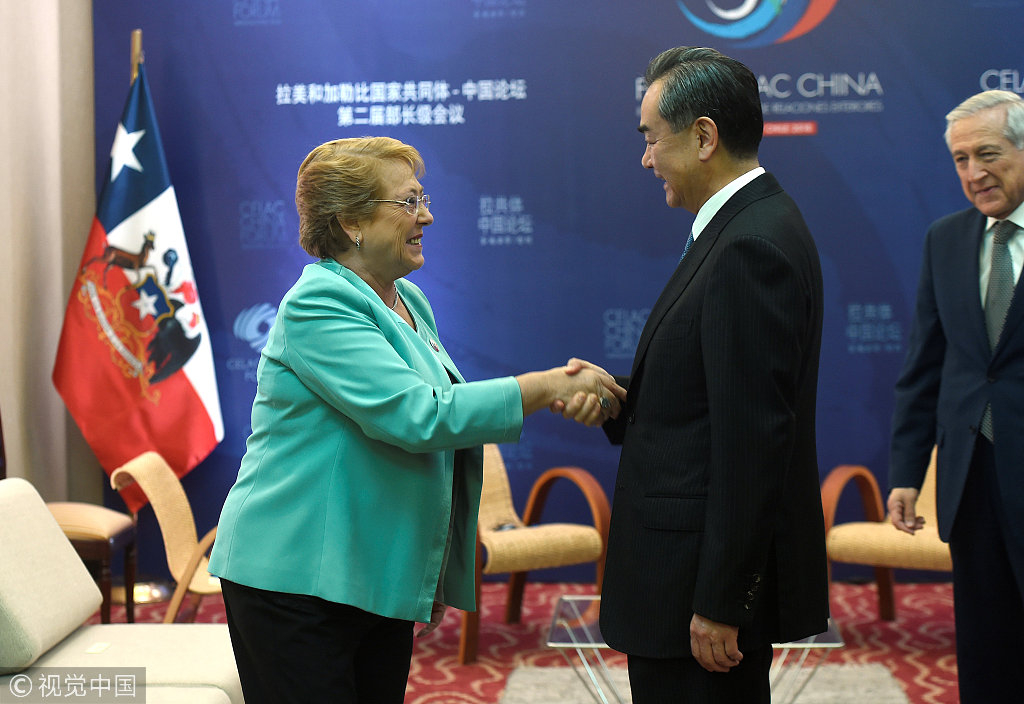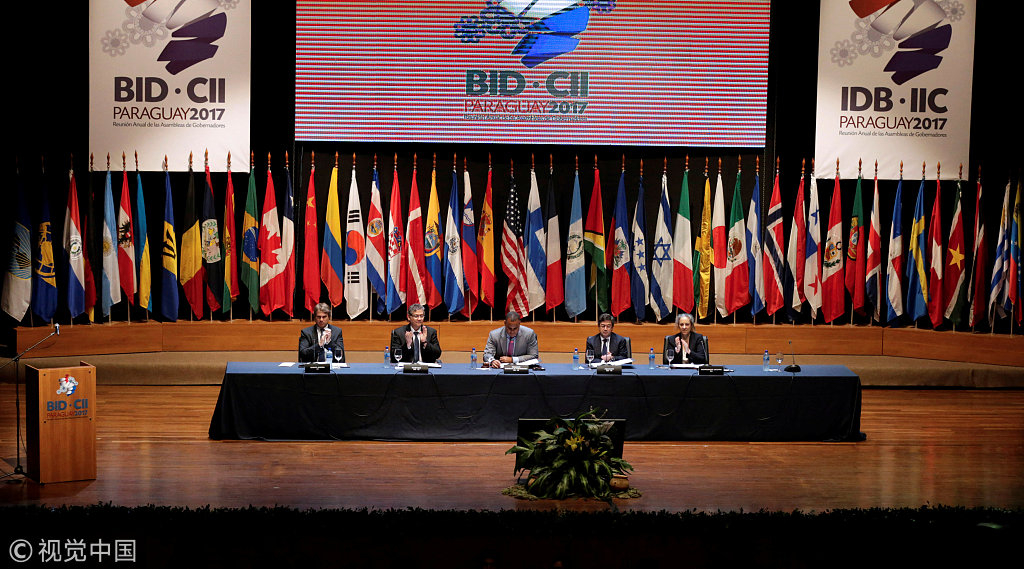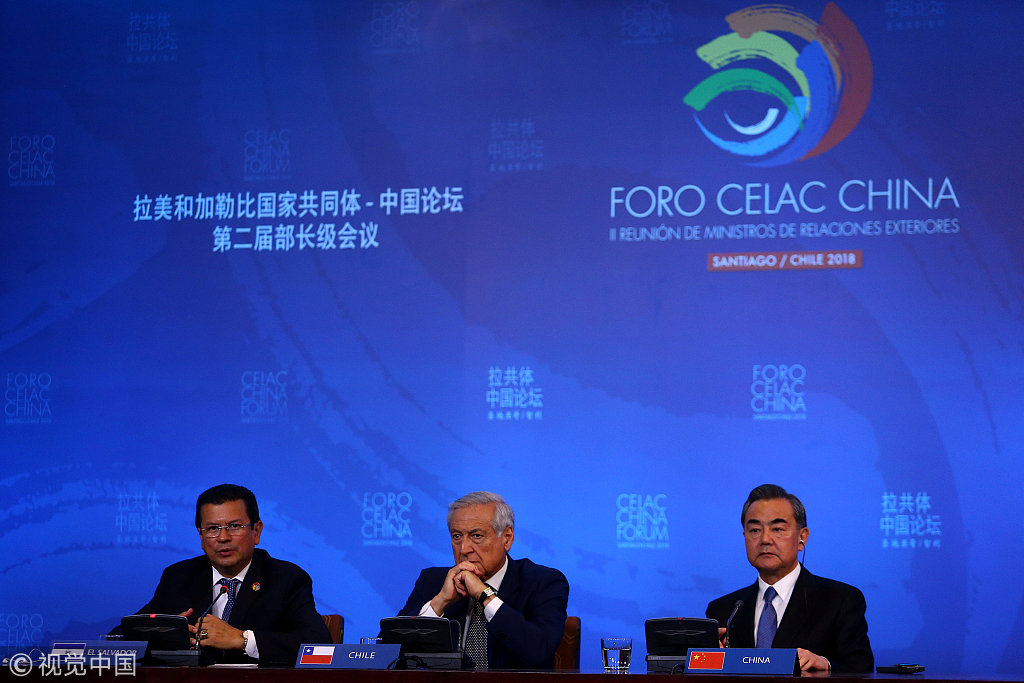Editor's note: Pan Deng is a member of the Academic Committee at the Charhar Institute and executive director of the Latin America and Caribbean Region Law Center of China University of Political Science and Law. The article reflects the author's opinion, and not necessarily the views of CGTN.
Since the beginning of the 21st century, after a long and “gradual” development of the relationship between
China and Latin America and the Caribbean (LAC), the two sides have now ushered in an era of “leap-forward” development of bilateral relations.
The speed, depth and breadth of such development are unprecedented, as it covers all aspects, multiple levels and a broad range of fields.
Politically, Chinese President Xi Jinping has set foot on the LAC four times and visited more than a dozen countries there. Almost all the top leaders of countries with whom China has diplomatic ties in LAC have also visited China.
Under the leadership of senior officials, the bilateral relations between China and LAC have been growing rapidly. The China-CELAC Forum, which was launched by China-CELAC Summit, has been held in China and LAC respectively, and its institutionalized operation has been making steady progress.
In the international arena, the two sides have begun to strengthen cooperation on global issues of common concern and maintain the overall interests of developing countries while safeguarding their own interests.
In terms of economic cooperation, China adheres to the principles of enterprise-led and market-oriented operation, responsibility-profit balance and win-win cooperation.

Chile's President Michelle Bachelet and China's Foreign Minister Wang Yi meet at China and the Community of Latin American and Caribbean States (CELAC) Forum in Santiago, Chile, January 22, 2018. /VCG Photo
Chile's President Michelle Bachelet and China's Foreign Minister Wang Yi meet at China and the Community of Latin American and Caribbean States (CELAC) Forum in Santiago, Chile, January 22, 2018. /VCG Photo
During the 18 years from 2000 to 2018, the scale of China-LAC trade increased from more than 10 billion U.S. dollars to more than 300 billion U.S. dollars, and the investment fields expanded from traditional sectors, such as energy, mining and infrastructure, to agriculture, manufacturing, IT, service industry, e-commerce, air transportation and many other fields.
China has become LAC's second largest trading partner and LAC has become China's second largest overseas investment destination only next to Asia. Both sides are one of the most dynamic business partners with each other.
At present, the economies of China and LAC countries are still highly complementary. Under the background of economic restructuring and reorientation of development strategy, China-LAC economic and trade will adjust accordingly in the future, with further optimization and upgrade, and realize a higher level of cooperation.
From the perspective of human and culture exchange, the Community of Latin American and Caribbean States encourages China to promote the teaching of the official language of the Community at Chinese schools.
While running Confucius Institutes in more than 20 countries in LAC, China has dramatically increased the number of scholarships for LAC countries.
With the joint efforts of China and LAC, exchanges in the fields of culture, sports, education, people-to-people exchanges, etc. have been expanded and deepened, bringing closer people on both sides through better mutual understanding and communication.
China-LAC relations have made rapid progress. Both sides have the same or similar history and experience. Both sides are also faced with the unfair and unreasonable international political and economic order and the transnational problems brought about by globalization.

Members of the Inter-American Development Bank attend the opening ceremony at the Annual Meeting of the Board of Governors of the Inter-American Development Bank in Asuncion, Paraguay, April 1, 2017. /VCG Photo
Members of the Inter-American Development Bank attend the opening ceremony at the Annual Meeting of the Board of Governors of the Inter-American Development Bank in Asuncion, Paraguay, April 1, 2017. /VCG Photo
In the new century, China's economy has entered a period of rapid growth, requiring a large number of raw materials and agricultural products rich in LAC. The economic transformation and re-industrialization that LAC countries have been pursuing urgently need foreign investment.
The upgrade of China-LAC relations in recent years is the inevitable result of the development of the two sides on their respective paths.
China has always respected the independent choice of LAC, has never interfered in the internal affairs of any country, and has always adhered to the principle of cooperation based on equality and mutual benefit.
At the same time, the interests and concerns of all parties involved have been taken into account to maximize the consensus with LAC countries.
In the past two years, China has established diplomatic relations with a number of countries in this region, which fully demonstrates that China and LAC are supported by people to pursue equal and mutually beneficial cooperation.
Although some LAC countries were affected by foreign countries and their relations with China experienced some ups and downs, they have soon returned to the normal track of cooperation with China. This fully demonstrates that China's principles and methods have gained more and more recognition and understanding from LAC countries.
China also pays special attention to maintaining a good balance between economic interests and social responsibilities when cooperation with LAC on the basis of mutual consultation, joint development and benefit sharing.

(L-R) El Salvador Foreign Minister Hugo Martinez, Chile's Foreign Minister Heraldo Munoz and China's Foreign Minister Wang Yi deliver a news conference at China and the Community of Latin American and Caribbean States (CELAC) Forum, in Santiago, Chile, January 22, 2018. /VCG Photo
(L-R) El Salvador Foreign Minister Hugo Martinez, Chile's Foreign Minister Heraldo Munoz and China's Foreign Minister Wang Yi deliver a news conference at China and the Community of Latin American and Caribbean States (CELAC) Forum, in Santiago, Chile, January 22, 2018. /VCG Photo
Not only has it never been heard that any country has fallen into the so-called “debt trap” because of its cooperation with China, but China has also provided help to the local economic and social development within its capabilities without any political strings attached. For example, in late March, China supported El Salvador's education program and donated 15,000 laptops to the country.
When encouraging Chinese enterprises to invest and expand business overseas, the Chinese government has paid special attention to matching China's high-quality production capacity and advanced equipment with the needs of LAC countries, so as to help LAC countries in need to improve their independent development capabilities.
While upgrading the local infrastructure in LAC, Chinese enterprises have created millions of jobs and invested hundreds of millions of U.S. dollars in environmental protection and public welfare projects.
They have made positive contributions to the promotion of local economic growth, social development and improvement of people's livelihood and are generally welcomed by local people from all walks of life.
China-LAC cooperation is South-South cooperation based on equality and mutual benefit. It is a voluntary choice made by both sides to seek self-development by playing to their own strength.
This cooperation is not aimed at any third party, nor does it intend to touch anyone's cheese, so it is neither necessary nor appropriate to be subject to the “will” of any third party.
A China-LAC relationship full of substantive content, vitality and vigor is bound to bring peace, development and prosperity to both sides, their neighboring areas and the whole world.
(If you want to contribute and have specific expertise, please contact us at opinions@cgtn.com.)





